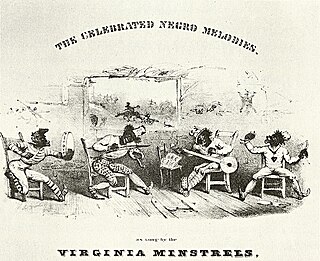
The minstrel show, also called minstrelsy, was an American form of theater developed in the early 19th century. The shows were performed by mostly white actors wearing blackface makeup for the purpose of comically portraying racial stereotypes of African Americans. There were also some African-American performers and black-only minstrel groups that formed and toured. Minstrel shows stereotyped blacks as dimwitted, lazy, buffoonish, cowardly, superstitious, and happy-go-lucky. Each show consisted of comic skits, variety acts, dancing, and music performances that depicted people specifically of African descent.

Joshua Lawrence Chamberlain was an American college professor from Maine who volunteered during the American Civil War to join the Union Army. He became a highly respected and decorated Union officer, reaching the rank of brigadier general. He is best known for his gallantry at the Battle of Gettysburg, leading an unexpected bayonet charge, for which he was awarded the Medal of Honor.

The Horse Soldiers is a 1959 American adventure war western film set during the American Civil War directed by John Ford and starring John Wayne, William Holden and Constance Towers. The screenplay by John Lee Mahin and Martin Rackin was loosely based on Harold Sinclair's 1956 novel of the same name, a fictionalized version of Grierson's Raid in Mississippi.

The Killer Angels is a 1974 historical novel by Michael Shaara that was awarded the Pulitzer Prize for Fiction in 1975. The book depicts the three days of the Battle of Gettysburg during the American Civil War, and the days leading up to it: June 29, 1863, as the troops of both the Union and the Confederacy move into battle around the town of Gettysburg, Pennsylvania, and July 1, July 2, and July 3, when the battle was fought. The story is character-driven and told from the perspective of various historical figures from both the Confederacy and the Union. A film adaptation of the novel, titled Gettysburg, was released in 1993.

Little Round Top is the smaller of two rocky hills south of Gettysburg, Pennsylvania—the companion to the adjacent, taller hill named Big Round Top. It was the site of an unsuccessful assault by Confederate troops against the Union left flank on July 2, 1863, the second day of the Battle of Gettysburg, during the American Civil War.
The Battle of Lewis's Farm was fought on March 29, 1865, in Dinwiddie County, Virginia near the end of the American Civil War. In climactic battles at the end of the Richmond–Petersburg Campaign, usually referred to as the Siege of Petersburg, starting with Lewis's Farm, the Union Army commanded by Lieutenant General Ulysses S. Grant dislodged the Confederate Army of Northern Virginia commanded by General Robert E. Lee from defensive lines at Petersburg, Virginia and the Confederate capital of Richmond, Virginia. Many historians and the United States National Park Service consider the Battle of Lewis's Farm to be the opening battle of the Appomattox Campaign, which resulted in the surrender of Lee's army on April 9, 1865.

The Battle of Las Guasimas of June 24, 1898 was a Spanish rearguard action by Major General Antero Rubín against advancing columns led by Major General "Fighting Joe" Wheeler and the first land engagement of the Spanish–American War. The battle unfolded from Wheeler's attempt to storm Spanish positions at Las Guasimas de Sevilla, in the jungles surrounding Santiago de Cuba, with the 1st U.S. Volunteer Cavalry and the 10th Regular Cavalry.

Gettysburg is a 1993 American epic war film about the Battle of Gettysburg in the American Civil War. Written and directed by Ronald F. Maxwell, the film was adapted from the 1974 historical novel The Killer Angels by Michael Shaara. It features an ensemble cast, including Tom Berenger as James Longstreet, Jeff Daniels as Joshua Chamberlain, Martin Sheen as Robert E. Lee, Stephen Lang as George Pickett, and Sam Elliott as John Buford.

The Appomattox campaign was a series of American Civil War battles fought March 29 – April 9, 1865, in Virginia that concluded with the surrender of Confederate General Robert E. Lee's Army of Northern Virginia to forces of the Union Army under the overall command of Lieutenant General Ulysses S. Grant, marking the effective end of the war.

The New Christy Minstrels are an American large-ensemble folk music group founded by Randy Sparks in 1961. The group has recorded more than 20 albums and scored several hits, including "Green, Green", "Saturday Night", "Today", "Denver" and "This Land Is Your Land". The group's 1962 debut album, Presenting the New Christy Minstrels, won a Grammy Award and remained on the Billboard 200 albums chart for two years.
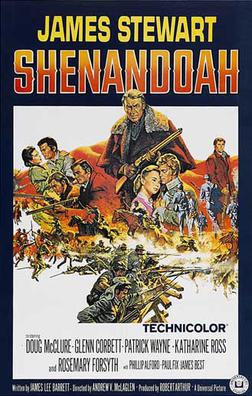
Shenandoah is a 1965 American film set during the American Civil War starring James Stewart and featuring Doug McClure, Glenn Corbett, Patrick Wayne, and, in their film debuts, Katharine Ross and Rosemary Forsyth. The picture was directed by Andrew V. McLaglen. The American folk song "Oh Shenandoah" features prominently in the film's soundtrack.

"The Yellow Rose of Texas" is a traditional American song dating back to at least the 1850s. Members of the Western Writers of America chose it as one of the Top 100 Western songs of all time. Many versions of the song have been recorded, the most popular of which was by Mitch Miller, whose version reached No. 1 in the United States in 1955. Its popularity made it an unofficial state song of Texas.

Major Dundee is a 1965 American Western film directed by Sam Peckinpah and starring Charlton Heston, Richard Harris, Jim Hutton, and James Coburn. Written by Harry Julian Fink, the film is about a Union cavalry officer who leads a contentious troop of Army regulars, Confederate prisoners, and Indian scouts on an expedition into Mexico during the American Civil War to destroy a band of Apaches who have been raiding United States bases and settlements in the New Mexico territory. Major Dundee was filmed in various locations in Mexico. The movie was filmed in Eastman Color by Pathécolor, print by Technicolor.

Gods and Generals is a 2003 American epic war drama film written and directed by Ronald F. Maxwell. It is an adaptation of the 1996 novel of the same name by Jeffrey Shaara and prequel to Maxwell's 1993 film Gettysburg. Most of the film was personally financed by media mogul Ted Turner. The film follows the story of Stonewall Jackson from the beginning of the American Civil War to his death at the Battle of Chancellorsville.
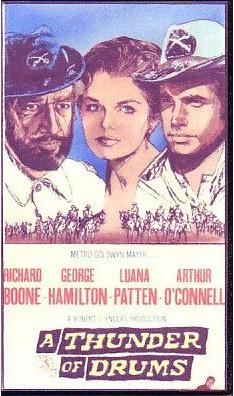
A Thunder of Drums is a 1961 American CinemaScope Western film directed by Joseph Newman and starring Richard Boone, George Hamilton, Luana Patten and Arthur O'Connell. The screenwriter James Warner Bellah adapted it from his 1946 short story "Command".

Castle Keep is a 1969 American war comedy-drama film combining surrealism with tragic realism. It was directed by Sydney Pollack, and starred Burt Lancaster, Patrick O'Neal, Jean-Pierre Aumont, Bruce Dern and Peter Falk. The film appeared in the summer of 1969, a few months before the premiere of Pollack's smash hit They Shoot Horses, Don't They?
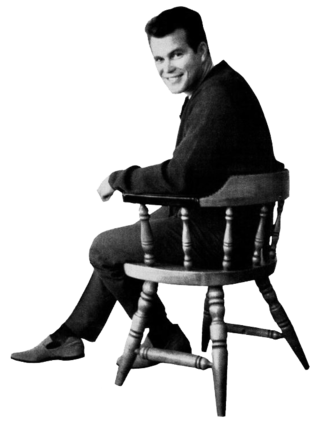
Lloyd Arrington Sparks, known professionally as Randy Sparks, was an American musician, singer-songwriter, and founder of The New Christy Minstrels and The Back Porch Majority.
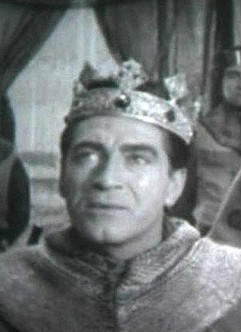
Richard the Lionheart was a British ITV television series which ran from 1961 to 1963, aimed at younger audiences.

Benny Baker was an American film and theater actor and comedian, and appeared in over 50 films between 1934 and 1988. He died in Woodland Hills, Los Angeles, California.
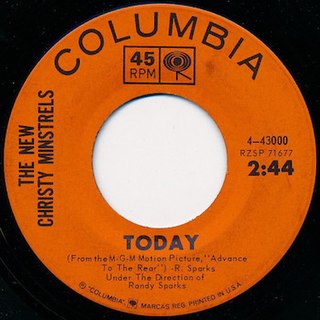
"Today" is a 1964 folk song that was a hit for The New Christy Minstrels. Written by the group's founder, Randy Sparks, it was introduced in the American comedy-Western film Advance to the Rear (1964) and released on the album titled Today.



















